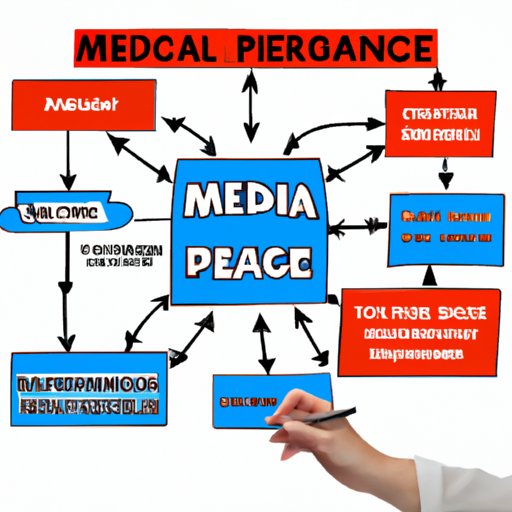Introduction
Medicare insurance is a health insurance program provided by the federal government for those who are 65 years of age or older, as well as for younger people with certain disabilities or end-stage renal disease. It is intended to provide medical care for those who may not have access to health insurance through an employer or private plan.
Definition of Medicare Insurance
According to the Centers for Medicare & Medicaid Services (CMS), Medicare is “a federal health insurance program that helps pay for hospital stays, doctor visits, prescription drugs, and other health care services for people who are 65 or older, certain younger people with disabilities, and people with End-Stage Renal Disease.”
Who Qualifies for Medicare Insurance?
Generally, most people who are 65 or older qualify for Medicare insurance, as long as they are U.S. citizens or permanent legal residents. Those who are under 65 may also qualify if they have certain disabilities or end-stage renal disease. People who qualify for Social Security Disability Insurance (SSDI) may be eligible for Medicare after two years.

Explaining the Different Parts of Medicare
Medicare is broken down into four different parts: Part A, Part B, Part C and Part D. Each part covers different types of medical expenses.
Part A & B
Part A covers hospital expenses such as inpatient care, skilled nursing facility care, hospice care, and home health care. Part B covers doctor visits, outpatient care, lab tests, and some preventive services. Both parts require a monthly premium.
Part C: Medicare Advantage
Part C, also known as Medicare Advantage, is a type of private health insurance plan. It combines all of the benefits of Parts A and B and often includes additional benefits such as dental, vision, and hearing coverage. Part C plans are offered by private insurers and typically require a monthly premium.
Part D: Prescription Drug Coverage
Part D is a prescription drug coverage plan that helps cover the cost of medications. Part D plans are offered by private insurance companies and often require an additional monthly premium.

Comparing Medicare to Private Health Insurance
When it comes to choosing between Medicare and private health insurance, there are several factors to consider. Here is a comparison of the two types of insurance.
Cost Comparison
The cost of health insurance can vary greatly depending on the plan. Generally speaking, Medicare may be more affordable than private health insurance plans. According to a study by the Kaiser Family Foundation, the average annual premium for a Medicare Advantage plan was $1,365 in 2019, compared to $5,588 for an employer-sponsored plan.
Coverage Comparison
Medicare and private health insurance plans both offer different levels of coverage. Medicare is designed to cover essential medical expenses such as hospitalization, doctor visits, and prescription drugs. Private health insurance plans may offer additional coverage such as dental, vision, and hearing, as well as coverage for alternative treatments like acupuncture and chiropractic care.
Examining the Cost of Medicare Insurance
In addition to the monthly premiums, Medicare plans may also require out-of-pocket expenses such as deductibles, copays, and coinsurance. The exact costs will depend on the type of plan you choose.
Premiums
Most Medicare plans require a monthly premium. The amount of the premium will vary depending on the plan. Some plans, such as Part A, do not require a premium.
Deductibles
A deductible is a set amount that must be paid before the insurance company begins to cover any medical expenses. The amount of the deductible will vary depending on the plan.
Copays
A copay is a fixed amount that must be paid each time you receive medical care. The amount of the copay will vary depending on the plan.

Exploring How to Sign Up for Medicare Insurance
To enroll in Medicare, you must meet certain eligibility requirements. You must be 65 years old or older and a U.S. citizen or legal resident. You must also have certain disabilities or end-stage renal disease.
Eligibility Requirements
In order to be eligible for Medicare, you must be 65 years old or older and a U.S. citizen or legal resident. You must also have certain disabilities or end-stage renal disease.
Enrollment Process
Once you have determined that you are eligible for Medicare, you can begin the enrollment process. You can apply online or by phone. You will need to provide information such as your Social Security number, date of birth, and address. After you have completed the application, you will receive a confirmation letter with your Medicare card.
Highlighting Benefits of Medicare Insurance
Medicare insurance provides access to needed healthcare services for eligible individuals. Here are some of the benefits of Medicare insurance.
Access to Doctors and Hospitals
Medicare insurance provides access to doctors and hospitals throughout the United States. This means that you can receive medical care wherever you are. Additionally, many Medicare plans provide coverage for preventive care such as vaccinations and screenings.
Variety of Plans
Medicare offers a variety of plans to choose from. This allows you to choose the plan that best fits your needs and budget. Additionally, some plans offer additional benefits such as dental and vision coverage.
Low Out-of-Pocket Costs
Medicare plans typically have lower out-of-pocket costs than private health insurance plans. This makes it easier to afford the necessary medical care.
Discussing Potential Drawbacks of Medicare Insurance
While Medicare insurance can provide access to quality healthcare, it does have some drawbacks. Here are some potential drawbacks of Medicare insurance.
Limited Coverage for Certain Services
Medicare does not cover all medical services. For example, it does not cover long-term care, vision exams, or hearing aids. Additionally, some services may require a copay or coinsurance.
Strict Rules and Regulations
Medicare has strict rules and regulations that must be followed. Failure to comply with these rules can result in fines or penalties. Additionally, some services may require pre-authorization.
Lack of Flexibility in Choosing Providers
Medicare plans typically require you to use certain providers. This can limit your choice of doctors and hospitals. Additionally, some plans require you to stay within a specific network of providers.
Conclusion
Medicare insurance is a health insurance program provided by the federal government for those who are 65 years of age or older, as well as for younger people with certain disabilities or end-stage renal disease. It is intended to provide medical care for those who may not have access to health insurance through an employer or private plan. Medicare offers a wide range of benefits, including access to doctors and hospitals, low out-of-pocket costs, and a variety of plans to choose from. However, there are some drawbacks, such as limited coverage for certain services, strict rules and regulations, and lack of flexibility in choosing providers. Ultimately, deciding whether or not to enroll in Medicare depends on your individual circumstances.
(Note: Is this article not meeting your expectations? Do you have knowledge or insights to share? Unlock new opportunities and expand your reach by joining our authors team. Click Registration to join us and share your expertise with our readers.)
